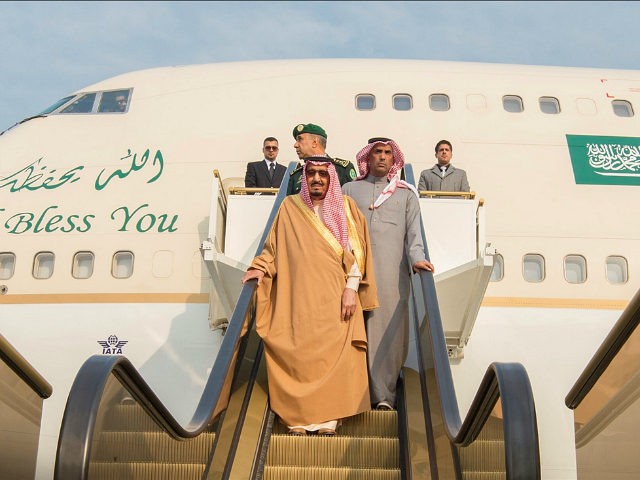King Salman of Saudi Arabia has departed Japan and arrived in Beijing where he and President Xi Jinping are expected to discuss expanding economic ties between their two nations, shortly after Deputy Crown Prince Mohammed bin Salman completed his visit to the White House Tuesday.
King Salman will stay in Beijing for three days, according to the Chinese Foreign Ministry, and meet with Xi as well as Premier Li Keqiang and National People’s Congress (NPC) Chairman Zhang Dejiang. “China attaches great importance to the friendship and cooperation with Saudi Arabia,” Foreign Ministry spokeswoman Hua Chunying told reporters on Tuesday. “We stand ready to take King Salman’s visit as an opportunity to take China-Saudi Arabia comprehensive strategic partnership to a higher level.”
While King Salman’s visit to Tokyo involved an honorific meeting with Emperor Akihito, the Chinese hope to use his presence to strengthen their foothold in the Middle East. Chinese state media outlets are heralding the visit as a chance for China to take over what was once considered America’s market to exploit.
Xinhua calls the visit an attempt to silence anti-globalization voices around the world. “As some scapegoat globalization for their sluggish economy, others remain open and cooperative to explore business opportunities and reap win-win fruits,” a Xinhua column on the visit reads, a clear reference to U.S. President Donald Trump’s opposition to globalist forces. Xinhua credits China for having “helped build 56 economic and trade cooperation zones in 20 countries along the routes with a combined investment surpassing 18.5 billion U.S. dollars, generating nearly 1.1 billion dollars in tax revenue and 180,000 jobs in those countries.” Saudi Arabia, the outlet concludes, is seeking to be a part of that development.
The Global Times, often the more combative alternative to Xinhua, suggests Salman’s presence in Beijing means he “puts Beijing ahead of Washington in his diplomatic visits.”
“This reflects Riyadh’s tendency to ‘Look East,'” the Times suggests. “The country is willing to develop a friendly relationship with Beijing on the premise that its ties with Washington remain intact. Saudi Arabia wants China’s support in regional and international affairs.”
The king’s visit has some competition, however, as Saudi officials celebrate the deputy crown prince’s visit with President Trump on Tuesday. The Gulf news organization Al-Arabiya cites Saudi officials calling the Trump meeting “a historic turning point” for bilateral relations. Al-Arabiya cites Bloomberg, which quotes a senior adviser to Mohammed bin Salman claiming the meeting “put things on the right track, and marked a significant shift in relations, across all political, military, security and economic fields.”
Among the most prominent points of agreement is the mutual distrust of Iran, newly emboldened by the Obama administration’s concessions package to Tehran known as the Joint Comprehensive Plan of Action (JCPoA), or the Iran nuclear deal.
Trump had already discussed other Middle East hotspots, including Yemen and Syria, with King Salman in a phone conversation.
Unlike relations with the White House, regional rival Iran is not a subject that Saudi Arabia and China appear to agree on. China has historically supported Russia in the UN Security Council, which has developed a particularly strong alliance with Iran in Syria. Neither China nor Saudi Arabia have entered the fray in Syria, though both have expressed concerns that the six-year-old civil war appears nowhere near its conclusion.
China will also have to overcome Saudi distrust as it ramps up an internal war on Islam. While Chinese Communist Party officials have been permissive of Islamic practices, particularly among its Hui minority, it has taken the opposite position in western Xinjiang, home to the nation’s Turkic Uighur minority. Uighurs are a majority-Muslim people; in their region, the Communist Party has banned Islamic garb on public transportation, forced shops to sell anti-Islamic items like alcohol and cigarettes, and banned children from religious observance.
This attitude appears to be trickling east into Hui-populated regions. This week, the Communist Party secretary in Ningxia province, Li Jianguo, warned that the Islamic State was attempting to recruit Chinese people to engage in “jihad, terror, violence,” urging more vigilance over Muslim populations. The result of the government’s warnings over Islam has been a growing popular distaste for the religion, according to a social media overview by the South China Morning Post.
Such a policy is anathema to the Saudi government, which sees itself as the preeminent defender of Islam globally. “We confirm that the Kingdom of Saudi Arabia stands with all its might behind the Islamic causes in general and we are fully ready for assistance and cooperation with your sisterly country as regards any effort or movement that serves Muslims’ issues,” King Salman asserted in Malaysia last month.

COMMENTS
Please let us know if you're having issues with commenting.